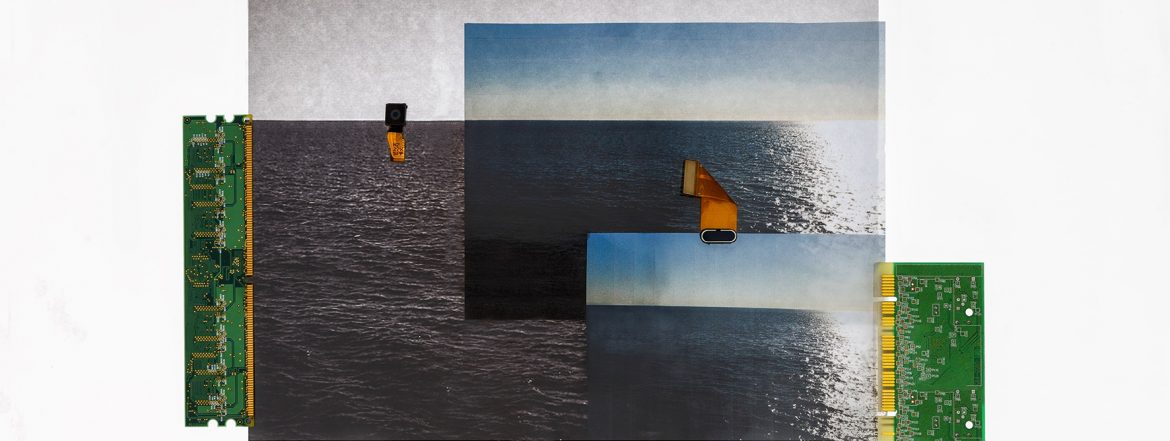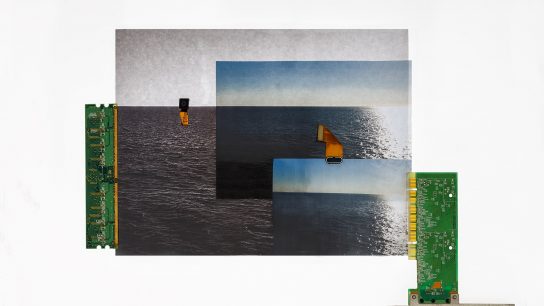This Sea That You See. Memory Postcards
by
Inauditas: Tracing the Sound of Migrant Memories in Venezuelan Women Photographers is an exhibition on migrant photography and photography of migration, focusing specifically on Venezuelan migration from 2016 to 2022. Each artist featured in this exhibition challenges the notion of photography that reduces it to the “visual,” while disorganizing a traditional notion of the “audible” that takes away its “auratic” effects, thus reinforcing the experience of photography as one of listening.
This Sea That You See. Memory Postcards includes both English and Spanish text translations.
This Sea That You See. Memory Postcards (English)
This Sea That You See. Memory Postcards combines photographs of the sea, small technological elements, and augmented reality. The sea alludes to all the images that have been and will be in the world. Those that have been done and those that are yet to be. The sea as a reflection of the changing space of the images and their transit.
The technology elements have been extracted from discarded cell phones, tablets, and computers. From these objects I keep the memory chips, graphics cards, small lenses, and connection straps and incorporate them into the final image. The idea behind this is that they are objects through which a photograph has “traversed.”
Additionally, with the use of augmented reality, I add the voices of present-day Venezuelan migrants currently living in countries as diverse as Chile, Colombia, Mexico, Spain, and the United States. I have asked these people: What is “missing” for you? What is “transiting” for you? What does “Venezuela” mean?
The result is an experience in a horizontal format alluding to the use of postcards, like those epistolary objects that maintain the relationship between people through images and words. In this work, I reflect on the archives of the territory, the image and the records of memories, through visual pieces in which the different supports of memory coexist. In this way, the reflection on the territory becomes an image that moves, that plays with evanescence of transit, on testimony and migration itself, because this sea that you see is no longer the same sea.
– Vilena Figueira
Curatorial Commentary
Performativity and the transmedia appear in the work of Vilena Figueira not only as a representation strategy, but as ideas-forms-gestures, producing the present reality and a certain future memory or alternative memory and in process. What these experimental postcards highlight is how the experience has become unknown, sometimes unintelligible, but not for that reason unrepresentable. What technology makes possible in this case is also what it denies. The testimonials embedded in these postcards can only be heard through the printed postcards and using an augmented reality app to access the audio via a mobile device.
“Este mar que ves. Postales de la memoria” (Español)
Este mar que ves. Postales de la memoria combina fotografías del mar, pequeños elementos tecnológicos y la realidad aumentada. El mar alude a todas las imágenes habidas y por haber en el mundo. Las que hayan sido realizadas y aquellas que aún están por hacerse. El mar como reflejo y espacio cambiante de las imágenes y su tránsito.
Con respecto a los elementos de tecnología, estos han sido extraídos de teléfonos celulares, tabletas y computadoras en desuso. De estos objetos, conservo los chips de memoria, las tarjetas gráficas, los pequeños lentes, y los flejes de conexión y los incorporo a la imagen final. La idea detrás de esto es que se trata de objetos por donde ha “transitado” alguna fotografía.
Adicionalmente, con el recurso de la realidad aumentada, agrego las voces de migrantes venezolanos que actualmente están radicados en países tan diferentes como Chile, Colombia, México, España, y Estados Unidos. A estas personas les he preguntado: ¿Qué es para ti “extrañar”? ¿Qué es para ti “transitar”? ¿Qué significa “Venezuela”?
El resultado es una experiencia en formato horizontal que alude al formato de las postales, como aquellos objetos epistolares que mantienen la relación entre personas a través de imágenes y palabras. En este trabajo reflexiono sobre los archivos del territorio, la imagen y los registros de los recuerdos, a través de piezas visuales en las que conviven los distintos soportes de la memoria. De esta forma, la reflexión sobre el testimonio y la migración se convierte en una imagen que se mueve, que juega a la evanescencia en el tránsito porque este mar que ves ya no es el mismo mar.
– Vilena Figueira
Comentario de las Curadoras
La performatividad y lo transmedial aparecen en la obra de Vilena Figueira no solo como una estrategia de representación, sino como ideas-formas-gestos, produciendo la realidad presente y una cierta memoria futura o memoria alternativa y en proceso. Lo que resaltan estas postales experimentales es cómo la experiencia se ha vuelto desconocida, a veces ininteligible, pero no por ello irrepresentable. Lo que la tecnología hace posible en este caso es también lo que niega. Los testimonios incrustados en estas postales solo se pueden escuchar mediante las postales impresas y usando una aplicación de realidad aumentada para acceder a los audios a través de un dispositivo móvil.
This photo essay is part of the Inauditas: Tracing the Sound of Migrant Memories in Venezuelan Women Photographers series, funded by a UCHRI Engaging Humanities grant.








